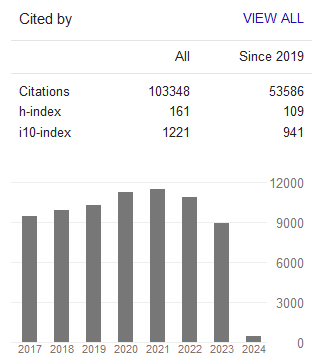The Relationship between Work Burnout and Employees' Mental Health as Measured by GHQ-28: A Field Study Using a Sample of University Lecturers
- Fares Jaber
- Marwan Al-Zoubi
Abstract
The purpose of this study is to investigate the relationship between work burnout and employees' mental health.Burnout has been defined as the suffering of employees from exhaustion (physical energy), and disengagement
(emotional energy) necessary to perform work tasks.
The sample consisted of 269 university lecturers. The sample filled two questionnaires. The first one is an Arabic
version of The Olenberg Burnout Inventory (OLBI) and the second one is the General Health Questionnaire
GHQ-28. Descriptive and advanced statistics such as zero order correlations and linear regression employed to
analyse the data obtained from the participants in the study.
The statistical analysis revealed a significant correlation exists between burnout and mental health (t= 24.25, ? ?
0.01). Furthermore, the results of linear regression indicated that mental health (in comparison with work load,
rank, gender and age) is the strongest predictor of burnout. Some practical and theoretical implications were
discussed.
- Full Text:
 PDF
PDF
- DOI:10.5539/ijbm.v7n24p44
Journal Metrics
Google-based Impact Factor (2023): 0.86
h-index(2023): 152
i10-index(2023): 1168

Index
- Academic Journals Database
- AIDEA list (Italian Academy of Business Administration)
- ANVUR (Italian National Agency for the Evaluation of Universities and Research Institutes)
- Berkeley Library
- CNKI Scholar
- COPAC
- EBSCOhost
- Electronic Journals Library
- Elektronische Zeitschriftenbibliothek (EZB)
- EuroPub Database
- Excellence in Research for Australia (ERA)
- Genamics JournalSeek
- GETIT@YALE (Yale University Library)
- IBZ Online
- JournalTOCs
- Library and Archives Canada
- LOCKSS
- MIAR
- National Library of Australia
- Norwegian Centre for Research Data (NSD)
- PKP Open Archives Harvester
- Publons
- Qualis/CAPES
- RePEc
- ROAD
- Scilit
- SHERPA/RoMEO
- Standard Periodical Directory
- Universe Digital Library
- UoS Library
- WorldCat
- ZBW-German National Library of Economics
Contact
- Stephen LeeEditorial Assistant
- ijbm@ccsenet.org
